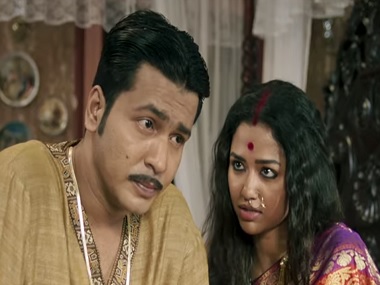Language: Bengali In art, experiments are often very dangerous. Bold experiments are even more so. If they work, they bring accolades. If they don’t, they are ruthlessly written off, or worse still, harshly criticised. Because in art, there are hardly any prizes for effort. Only outcomes matter. [caption id=“attachment_6850671” align=“alignnone” width=“825”]  A still from Manbhanjan. YouTube[/caption] Abhijit Chowdhury’s adaptation of Rabindranath Tagore’s short story Manbhanjan is not only a competent attempt on all quarters, it turns out to be a rather enjoyable outcome as well. The two-part miniseries rides on the able shoulders of its trio of leading stars, but that is not all. With beautiful music, a taut script and the able direction by Chowdhury, this is a show that kept me engrossed, despite all the distracting departures and liberties it took with respect to the original story by the great auteur. What matters the most is not that Chowdhury decided to take these liberties. What matters is that they worked. The basic plot of the show is similar to Tagore’s original story. Gopinath Seal – the son of a zamindar in Kolkata during the days of the British Raj – rolls in wine and women all day, never turning a loving eye towards his wife Giribala. Instead, Gopinath frequents the theatres, where he seems to be bewitched by the lusty beauty of the reigning star Labanga. His admiration of the actress is not restricted to a respectful audience-performer relationship anymore. He begins frequenting the greenroom as well, where he begins a whirlwind affair with the woman who basks in the adulation and attention of men. Back home, his wife Labanga mourns her husband’s apathy day and night. Comely as she herself may be, experiences an irrepressible curiosity to meet the woman who has won her husband’s heart. One day, on a clandestine visit to the theatre, she witnesses the world of stage and plays and music for the first time. Things take a completely unexpected turn from there on. Tagore’s story is a timeless tale of a woman’s emancipation, a bold ode to the notion of womanhood and a beautiful story of how fate and destiny turn the wheels of fortune for all of us. At the same time, it also explores the frailty of relationships and talks about the dangers of vanity. Chowdhury’s adaptation is able to address all these quite faithfully. In other words, he only adds to the story. He does not take anything away from it – which is an extremely intelligent decision to make for a filmmaker who wants to draw from an immensely popular source material. There is a hint of revenge – an episode of comeuppance – in the story. It is captured and maintained in the climax of Chowdhury’s series too. And that is all I am going to say about whether justice has been done to the original story, or whether a frivolous and convenient attempt has been made to ride the shoulder of a giant (clearly the former). As for the additions and twists given to the story, they mostly work because they have been thought through. Notwithstanding some logical fallacies and Shakespearean liberties, the principal crux of the message comes through, resulting in certain magnificent dramatic moments. The path to get there, however, is not free of flaws. There are moments when a stitch here or a link there seems just too improbable or unnecessary. In Tagore’s story, for instance, Giribala and Labanga never meet face to face. Chowdhury chose to make this happen. The vehicle he uses to enable this meeting is somewhat dubious and incredible. Certain additions, on the other hand, enhance the story. The expansion of the role of the playwright is one such instance. Also noticeable are the numerous references that Chowdhury has hidden in his series – much like Easter eggs. There are veiled references to Jalsaghar, Postmaster, Charulata and many other films, stories, songs, poetry – and even people. Sohini Sarkar plays Giribala, and presents a tragic portrait of a woman whose husband does not care for her. Sarkar’s quiet charm and brimming helplessness makes us root for her from the beginning to the end. Amrita Chattopadhyay offers the ruthlessly alluring and vexing side of her character in the first half, and becomes an exercise in decay and desperation in the second – thus painting a grim warning of how fragile a person’s beauty can be. Chattopadhyay’s role was a difficult one, also because unlike the other two in the trio, she did not have a reference that she could turn to. Anirban Bhattacharya, on the other hand, had plenty to go with. He delivers his character with the perfection of a pro. He sways and staggers in intoxication, mouthing obscenities at those who could not care less of his social status, and is laughably oblivious of the affairs of his estate. Bhattacharya is a treat to watch as usual. I did feel that he had completely drowned himself in his character. The only rare scenes where he falters are those that reek of lazy writing. A quick work of appreciation also for Brishti Roy, who apparently auditioned for the role of Shudho, the trusted friend and attendant of the nobleman’s wife. Watch out for her. In a relatively short role, she stands out almost as much as the big stars do. And that is extremely commendable. I loved the music. There were some lovely songs that were apt for the situations portrayed. The choreography could have been better, but plays of those days always had muted dance movements. Although the doses of humour that Chowdhury injects into the series work at times, they also fail equally frequently. Overall, though, I quite liked Chowdhury’s adaptation. Not even for once did it seem as if its makers were taking Tagore for granted. Manbhanjan is currently streaming on Hoichoi. Rating: ***
Far from a frivolous and convenient attempt, Hoichoi’s Manbhanjan has been made to ride the shoulder of a giant in Rabindranath Tagore.
Advertisement
End of Article


)
)
)
)
)
)
)
)
)



